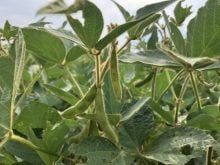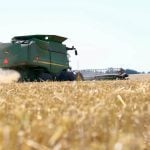Shorter rotations between pea crops in Saskatchewan may lead to more disease and lower yields, according to preliminary research from a project at the Scott Research Farm and at Melfort, Sask.
Daniel Ulrich, agronomist with Agriculture Canada, is investigating whether increasing peas in rotations makes sense in terms of yields. He is running a project with three direct-seeded rotations that include peas.
Rotations used in the test are continuous pea, pea-wheat, pea-canola-wheat, and canola-wheat-pea-wheat.
He has also been investigating the impact of fungicide on disease and yields in the rotations.
So far, the most significant sign in the preliminary work has shown up in the shorter rotations.
More disease has appeared in the pea-wheat rotation, said Ulrich, although it hasn’t affected yields.
In the continuous pea rotation, disease was prevalent and hurt yields.
Yields improved in the continuous rotation by as much as 48 percent when Quadris fungicide was used but the other rotations still yielded higher.
Ulrich noted shorter rotations seemed to have more weeds, which may affect yields. Continuous pea rotation also trapped less moisture than other rotations.














